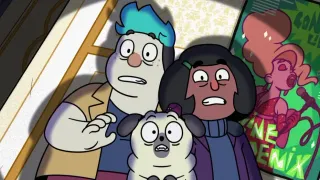July 4, 2015
Beethoven Finales
Kilian Melloy READ TIME: 5 MIN.
It's a wrap for the 20th season of the San Francisco Symphony under Music Director Michael Tilson Thomas. A three-week Beethoven Festival, highlighted by semi-staged concerts and a marathon historical re-enactment, all performed by the orchestra, the SFS Chorus and first-class guest artists, kept Davies Symphony Hall jumping right up to the finale.
Outstanding artistic results and an upbeat atmosphere helped persuade naysayers who earlier complained that a Beethoven celebration was unexcitingly safe and unimaginative. A few fans and writers, possibly spoiled by past programming of riskier repertoire, temporarily lost sight of what they know. A great performance of Beethoven is virtually critic-proof and offers emotional and intellectual sustenance. It doesn't get much better than this. The ambitious scope of the programming sealed the deal on the commitment and courage of the maestro and his loyal band.
On the eve of the Supreme Court decision on gay marriage, Beethoven's operatic ode to the power of married love, his only opera "Fidelio" summed up the festival in a semi-staged production starring Swedish soprano Nina Stemme as Leonore and American tenor Brandon Jovanovich as her unjustly imprisoned husband Florestan.
The luxury casting didn't stop with the leads. Secondary roles were essayed by the likes of rising star American artists: tenor Nicholas Phan (attractive and confident) as Jaquino, and soprano Joelle Harvey (rich-toned and perky) as Marzelline. San Francisco Opera veteran bass Kevin J. Langan gave a predictably characterful performance as the jailer Rocco, and bass-baritone Alan Held returned to DSH after his SFS debut in 2012 in "Duke Bluebeard's Castle" to convincingly sing the role of the evil Don Pizarro.
Another casting coup came in Italian bass-baritone Luca Pisaroni's brief but impressive appearance as Don Fernando. The internationally recognized singer was career multi-tasking between performances as the Count in Mozart's "The Marriage of Figaro" across the street at SFO. He also appeared recently at DSH with MTT in Stravinsky's "Pulcinella."
Also participating in that previous concert, American tenor Matthew Newlin, currently a member of the ensemble at Deutsche Oper Berlin, was again on hand to movingly sing as the First Prisoner. Got the picture? It was clear no stops were un-pulled when it came to Festival production costs. It begged the question of value for money, and if the success of "Fidelio" was the best example, it was worth every penny.
Guest stars of Stemme's and Jovanovich's caliber alone yielded lavish dividends. Making her SFS debut, the rightfully renowned soprano has been heard before with better results (remember her fabulous Brunhilde at SFO?), but she remains a splendid Leonore, and she used her superior acting skills to create a strong portrait of a woman willing to pose as a male to save her man. And what a hunk of man to save! Jovanovich gave power and thrilling voice to his big aria at the top of Act II. Looking pretty buff for a guy in solitary confinement, he still conveyed Florestan's anguish with fervently believable pathos.
The only surprise drawback was in the "staging" itself, minimalist in the extreme. Characters and chorus dressed in black made their entrances and exits on a mostly darkened stage and surrounding terrace. The lights went up appropriately at the triumphant conclusion, but a concert version simply sung at lecterns would probably have been just as effective.
Missa Transit
What a distance from the relatively overblown (and occasionally downright cheesy) staging of Beethoven's "Missa solemnis" from two weeks before. MTT gave an interview on NPR with Michael Krasny shortly before the musically strong but visually overpowering performances started. With characteristic charm, our musical pied piper quickly explained all we really needed to know before approaching the "production." A light show that often looked like iTunes visualizations (Finn Ross) and some needless characterizations imposed on the soloists by stage director James Darrah (so impressive before with his handling of SFS semi-staged productions of "Peter Grimes" and "Peer Gynt") almost submerged the desired impact. Scenic designers Emily Anne MacDonald and Cameron Jaye Mock set the stage with an impressive framework evocatively lit by David Finn. We wish MTT had let it go at that.
His new look at Beethoven's glorious and problematical (mostly for the musicians) score wound up looking like pretentious pandering to the short-attention-span demographic. The "concept" even borrowed from remembered productions of Leonard Bernstein's "Mass." Making the Pacific Boychoir (Kevin Fox, director) act cute is redundant, and Ragnar Bohlin's SFS Chorus doesn't need to move about to be moving.
The soloists and orchestra brought the concert into more successful focus with some wonderful and predictably satisfying results. Soprano Joelle Harvey, mezzo-sopranos Julie Boulianne and Sasha Cooke (nuff said), tenor Brandon Jovanovich (ditto), and powerful bass-baritone Shenyang combined with the exquisitely wrought violin solos of Concertmaster Alexander Barantschik to triumph over the mostly distracting visuals. Was that the point after all? I must have missed that in MTT's much easier radio suggestion that the audience merely experience the "Missa solemnis" like a guided tour through a great cathedral.
The centerpiece of the entire Festival, for a sold-out crowd at DSH, was a re-creation of the marathon "Akademie" concert at the Theater an der Wien in Vienna that Beethoven himself conducted on December 22, 1808. For starters, MTT gave us some interesting factoids (we still love his little talks) about the cold weather, sparse attendance and lack of critical reviews (!) for an occasion that included the premieres of the Fifth and Sixth Symphonies, the Fourth Piano Concerto and the Choral Fantasy. Beethoven must have had as much energy (albeit manic) as our own dynamic maestro.
Selections from the Mass in C Major were presented with palette-cleansing variety throughout the night lasting four hours and 40 minutes with three intermissions. Soloists soprano Nikki Einfeld, mezzo Abigail Nims and previously mentioned tenor Nicholas Phan and bass-baritone Shenyang rode effortlessly above the sonorous SFS Chorus and orchestra. Two different versions of the orchestra (Beethoven's Vienna was obviously non-union) and one pianist, awesomely talented Jonathan Biss, fleshed out the orchestral sections of the bill with uniformly excellent results. In a few cases there were some striking revelations.
After a lifetime of admittedly loving the Sixth Symphony, "Pastoral" least, MTT's latest vision changed my affectionate regard to fresh admiration. When the orchestra gave a fiery interpretation of the famous Fifth later, it was hardly more exciting. The call to arms in the opening of the Fifth only shows a different side of Beethoven's quest for liberation. The softer natural world of the Sixth offers a gentler deliverance.
Smack-dab in the middle of the show, superstar soprano Karita Mattila, looking every inch the diva in lots of jewelry and a red lace dress, exited her limousine just long enough to give a knockout performance of the concert aria "Ah! perfido," Opus 65. It was one flash in three weeks of great moments to underline the reasoning and appropriateness in celebrating Beethoven along with MTT's two decades with the SFS.






